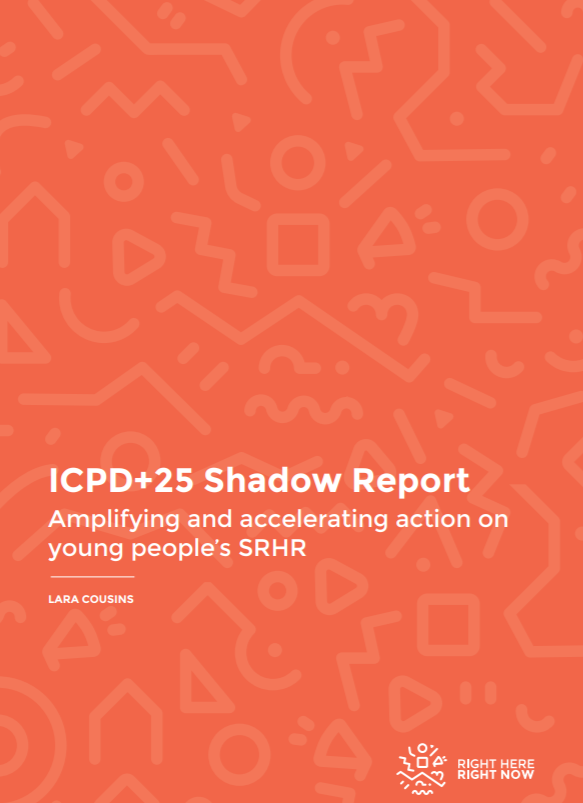ICPD+25 Shadow Report: Amplifying and accelerating action on young people’s SRHR
Right Here Right Now (RHRN) is a fiveyear programme and global strategic partnership active in ten countries (Bangladesh, Nepal, Indonesia, Pakistan, Kenya, Uganda, Zimbabwe, Senegal, Honduras, Bolivia), and the Caribbean sub-region. Our partnership envisions a world where all young people are able to access quality and youth-friendly health services, and are not afraid to openly express who they are and who they love.
We believe that young people, everywhere, have the inalienable right to make their own choices, and lead happy and healthy lives. In this respect, our partnership strives for the following impact across Africa, Asia, and Latin America:
- The protection, respect and fulfilment of the sexual and reproductive health and rights (SRHR) of young people, including girls, young women and young lesbians, gays, bisexuals, transgender and intersex (LGBTI) individuals, with a focus on:
- Freedom from stigma, discrimination and violence;
- Access to comprehensive youth-friendly services;
- Access to comprehensive information and education on sexuality; and
- Space for young people’s voices.
The RHRN partnership engages in advocacy at national, regional and international levels, in order to ensure progressive and inclusive SRHR norms, standards and policies and to promote accountability. Monitoring, follow-up and review of the 1994 Programme of Action of the International Conference on Population and Development (ICPD) is one of the key processes that RHRN follows and influences.
ICPD Beyond 2014 and RHRN Priority Areas
In 1994, 179 governments worldwide met in Cairo, Egypt and adopted the groundbreaking ICPD Programme of Action, positioning human rights at the centre of sustainable development, and recognizing reproductive rights as human rights,
as well as young people and adolescents as rights holders in regards to their sexual and reproductive health (SRH). Moreover, in upholding that the full enjoyment of reproductive health implies that “people are able to have a satisfying and safe sex life,” The ICPD Programme of Action reinforced a holistic understanding of individuals’ sexual and reproductive wellbeing, accounting not only for the right to be free from abuse or violations, but the right to experience one’s sexuality in a
fulfilling, satisfying, and in turn pleasurable way.
20 years on, in reviewing achieved progress and challenges in relation to the implementation of the ICPD Programme of Action, governments reaffirmed the enduring significance of the ICPD, advancing the paradigmatic shift sparked at Cairo
through regional ICPD Beyond 2014 agreements. In these agreements, governments recognized that though significant progress had been made over the previous 20 years, such progress had not been universal, and severe inequalities persisted.
In addition, there are still key issues that require further attention and action, in order to ensure that the needs and rights of all individuals are met. As such, in regional agreements such as the Asian and Pacific Ministerial Declaration on Population
and Development, the Addis Ababa Declaration on Population and Development in Africa Beyond 2014, and the Montevideo Consensus on Population and Development, governments built upon and strengthened previous commitments included in
the original ICPD Programme of Action. Notably, governments strengthened their commitments in relation to RHRN priority areas, namely on:
- Comprehensive sexuality education (CSE):3,4,5 Governments across the three regions made commitments related to national policy and implementation of CSE, including commitments to ensure that CSE provides “accurate information on human sexuality, gender equality, human rights, and sexual and reproductive health;”6 that these programmes are consistent with young people’s evolving capacities; to implement such programmes both in and out of school; to link CSE programmes with the provision of SRH services; and that implementation be participatory and include the active involvement of young people themselves.
- Adolescents’ and young people’s access to youth-friendly SRH services:7,8,9 Governments similarly made ommitments regarding national policy, financing and implementation of adolescent SRH services. Among these
commitments are achieving universal access to SRH services with particular attention to adolescents’ and young people’s needs; that such services be implemented with a gender, human rights, intergenerational and intercultural
perspective, and respect young people’s confidentiality and privacy; ending practices that violate women and adolescent girls’ rights, such as parental or marital consent requirements to obtain health services; and that such services should enable adolescents and young people “to have a responsible, pleasurable and healthy sex life” and “to take free, informed and responsible decisions regarding their sexual and reproductive life and the exercise of their sexual orientation.” - Access to safe abortion services, where governments made commitments in relation to national law, policy and implementation. These include realizing universal access to the management of preventable complications arising from unsafe abortion; ensuring in cases where abortion is decriminalized the availability of safe, comprehensive, and quality abortion services; and for States to amend “their laws, regulations, strategies and public policies relating to the voluntary termination of pregnancy in order to protect the lives and health of women and adolescent girls [and] improve their quality of life.”
- Respecting, protecting, and fulfilling the rights of LGBTI individuals, for which commitments include promoting “policies that enable persons to exercise their sexual rights, which embrace the right to a safe and full sex life, as well as the right to take free, informed, voluntary and responsible decisions on their sexuality, sexual orientation and gender identity;” promulgating and enforcing “laws to prevent and punish any kind of hate crimes without distinction of any kind, and take active steps to protect all persons from discrimination, stigmatization and violence;” and eliminating discrimination based on sexual orientation and gender identity.
Read the I”CPD+25 Shadow Report: Amplifying and accelerating action on young people’s SRHR”
